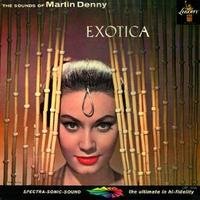Martin Denny - Authenticator of Exotica
Born:
April 10, 1911;
New York, NY
Died:
March 02, 2005;
Honolulu, HI
As the King of Exotica, Martin Denny arguably stands as its most innovative contributor.
Growing up in New York, Denny was a child piano prodigy. By the 1930s, he was touring all over South America with the Don Dean Orchestra.
Much like Don the Beachcomber and Trader Vic, Denny's travels would serve as major sources of creative inspiration as he picked up exotic rhythms and a wide assortment of ethnic instruments.
After serving in the air force during WWII, he returned to the U.S. in 1945 and studied at the Los Angeles Conservatory under jazz composer Wesley La Violette.
Wanting to stay put after years of travel and service abroad, Denny was ultimately lured to Hawaii in 1954 to play for six-months at Don the Beachcomber.
The next year, he signed on to Liberty Records and formed his own group with vibist Arthur Lyman, bassist John Kramer, percussionist Auggie Colon and himself on piano.
It was Colon who ignited Denny's full immersion into the richness of Exotica by introducing him to Les Baxter's landmark album, Ritual of the Savage.
Denny was so enthralled that he would go on to adapt and record over two dozens of Baxter's compositions.
The most famous was Denny's adaptation of Quiet Village, appearing on his 1957 debut album Exotica. After Hawaii joined the U.S. in 1959, the song and album became major hits, reaching #2 and #1 on the Billboard Top 40. To this day, Quiet Village remains quintessential Exotica.
Much of Denny's unique sound no doubt came from his novel use of ethnic instruments such as Buddhist bells, Burmese cymbals, congas, gongs, Japanese shamisens and West Indian guiros.
His signature sound, however, was the result of pure serendipity.
While playing on an open-air stage at the exotic Shell Bar in 1956, Denny's combo was interrupted by the sound of bullfrogs croaking in the pond below. As soon as the band stopped playing, the croaking stopped.
When they resumed, so did the croaking. As a gag, his band mates joined in by making tropical bird calls.
They didn't take it seriously until someone from the audience later requested that they replay the song, thinking the frog and bird noises were part of the arrangement.
That's when Denny and his crew realized they were onto something.
From then on, Quiet Village and many other Denny songs would be recorded with a wide variety of animal shrieks, caws and yelps sprinkled into them, giving his music a unique and hypnotic authenticity.
Denny continued experimenting with an eclectic and seamless mix of Latin, Polynesian and Far-Eastern sounds on Forbidden Island, Primitiva, Hypnotique, Latin Village, The Enchanted Sea, and many others. He even threw African and Indian rhythms into the mix with Afro-Desia and A Taste of India.
While purists and anthropologists might take offense at Denny's romanticized, often playful capture of Native vibes, for him that was precisely the point. As he pointed out, "My music has always been like fiction, no authenticity; I didn't want to make African music--I only wanted to suggest how African music might sound."
This tongue-in-cheek attitude was no doubt buttressed by his album covers, often featuring alluring women in skimpy tropical/jungle attire. Like Polynesia fever and James Bond movies of the era, Denny's music was bound to appeal towards urban male sophisticates in search of faraway escapades.
But as the 70s began and Tiki culture faded, so did interest in Exotica music and Denny's popularity.
Three years after retiring in 1985, Denny was lured back out for a reunion tour with Arthur Lyman and their remaining band mates, playing to sold-out venues all over Japan.
In 1990, Denny was finally recognized by the Hawaii Academy of Recording Arts with a Na Hoku Hanohano Lifetime Achievement Award.
Thankfully, Martin Denny would also live to see the renewed interest in his music that came with the Tiki revival of the 90s, no doubt spurring him to remain active to the very end.
His last was concert was a benefit for Tsunami victims on February 13, 2005, just three weeks before his death.





